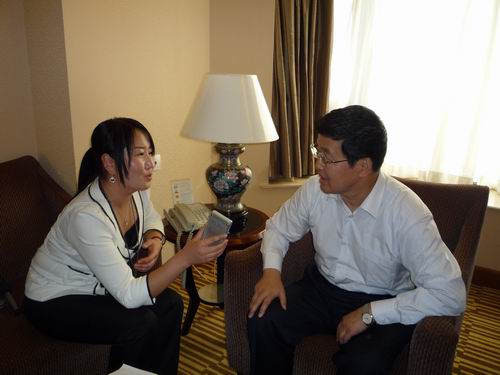 |
|
|
Mr. Baatar, Chairman
of Inner Mongolia
Autonomous Region
answering the
interview by the
Inner Mongolia TV
reporter.
|
The following is an excerpt of an interview of Mr. Baatar, an ethnic Mongolian and the Chairman of Inner Mongolia Autonomous Region (IMAR), by the Inner Mongolia TV:
Correspondent: Welcome, Chairman
Baatar: Thank you
Correspondent: On behalf of our audience, I thank you for spending your precious time with us. It has been a strategic policy of the Government and Party Committee of the Autonomous Region to prioritize improving the living standard of the people and boosting the economy of the region. Therefore, increasing the income of average citizens, in particular herders, has been one of the main topics drawing people's attention. As we all know, the Government of the Autonomous Region has done a great deal of work towards this effort. However, unfortunately the improvement of herders' living standard is still relatively slow. In your opinion, what is the reason for this slowness?
Baatar: In recent years, the Inner Mongolia Autonomous Region has seen a steady growth of the economy, becoming China's fastest growing economy for the last 8 years. However, if you compare our Autonomous Region with other economically advanced provinces, the backwardness of our region has still not changed yet. The gap between economic growth and the people's income level is widening. The Inner Mongolia Autonomous Region is home to 1.5 million herders who mostly live in remote and frontier areas. Especially in recent years, recurring natural disasters have brought substantial damage to herders' livelihood. One of the main reasons of herders' living standard's downward slide is that the policies of "livestock grazing prohibition" and "raising livestock in fence" has increased production costs exponentially but decreased herders' income dramatically. In addition to this, the country has never increased the subsidy to herders while it has increased the subsidy to peasants on an annual basis. According to statistics of the Inner Mongolia Autonomous Region, in 2008 alone, the country invested 6,270,000,000 Yuan (12 billion USD) to agricultural areas whereas only 95,410,000 Yuan is allocated to pastoral areas. This gives us a ratio of 66:1. For peasants, the subsidy was 540 Yuan for every individual. But the herders received only 63 yuan subsidy average. The ratio is 9:1. Under these circumstances, herders and their production have been experiencing extreme hardships. As a result many herders have no choice but to cultivate their grazing land to grow crops in order to make a living. This in turn further degraded the grassland eco-system. I think it is vitally important and urgent matter to increase the subsidy to herders.
Correspondent: In response to herders' extreme hardships, what plan of action does the government have in mind for 2010 and afterward?
Baater: Our Autonomous Region is exploring many new possibilities to improve the herders' living condition. One such action is to ensure that the annual subsidy for each herder in the areas of "livestock grazing prohibition" should not be lower than 3000 yuan for at least 5 years. In areas where grass and water resources are relatively rich, pilot projects of partially restoring livestock grazing should be launched. At the same time, the policy of providing subsidy to herders to encourage them to purchase animals of better breeds should be firmly followed. A favorable policy should be adopted to subsidize herders' investment for infrastructure and services.Click here for the original interview in Mongolian.







